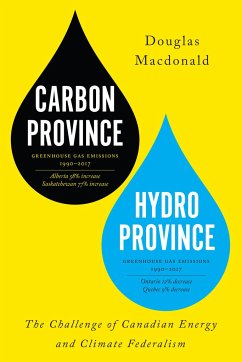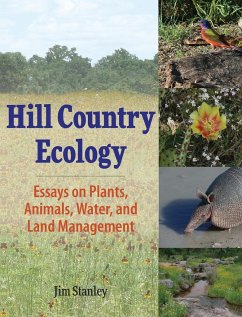Douglas Macdonald
Carbon Province, Hydro Province
The Challenge of Canadian Energy and Climate Federalism
Douglas Macdonald
Carbon Province, Hydro Province
The Challenge of Canadian Energy and Climate Federalism
- Gebundenes Buch
- Merkliste
- Auf die Merkliste
- Bewerten Bewerten
- Teilen
- Produkt teilen
- Produkterinnerung
- Produkterinnerung
Carbon Province, Hydro Province is a major contribution to both academic understanding and the vital question of how our federal and provincial governments can effectively work together, and thereby, for the first time, achieve a Canadian climate-change target.
Andere Kunden interessierten sich auch für
![Kouchibouguac Kouchibouguac]() Ronald RudinKouchibouguac100,99 €
Ronald RudinKouchibouguac100,99 €![Cultivating the Nile Cultivating the Nile]() Jessica BarnesCultivating the Nile123,99 €
Jessica BarnesCultivating the Nile123,99 €![The Everglades The Everglades]() Marjory Stoneman DouglasThe Everglades27,99 €
Marjory Stoneman DouglasThe Everglades27,99 €![Rethinking Environmental Education in a Climate Change Era Rethinking Environmental Education in a Climate Change Era]() Tonya RooneyRethinking Environmental Education in a Climate Change Era180,99 €
Tonya RooneyRethinking Environmental Education in a Climate Change Era180,99 €![Hill Country Ecology Hill Country Ecology]() Jim StanleyHill Country Ecology78,99 €
Jim StanleyHill Country Ecology78,99 €![Conservation plan of Hindon River in-between Muzaffarnagar and Ghaziabad Conservation plan of Hindon River in-between Muzaffarnagar and Ghaziabad]() M K SinghalConservation plan of Hindon River in-between Muzaffarnagar and Ghaziabad17,95 €
M K SinghalConservation plan of Hindon River in-between Muzaffarnagar and Ghaziabad17,95 €![Planning and Installing Micro-Hydro Systems Planning and Installing Micro-Hydro Systems]() Chris ElliottPlanning and Installing Micro-Hydro Systems310,99 €
Chris ElliottPlanning and Installing Micro-Hydro Systems310,99 €-
-
-
Carbon Province, Hydro Province is a major contribution to both academic understanding and the vital question of how our federal and provincial governments can effectively work together, and thereby, for the first time, achieve a Canadian climate-change target.
Hinweis: Dieser Artikel kann nur an eine deutsche Lieferadresse ausgeliefert werden.
Hinweis: Dieser Artikel kann nur an eine deutsche Lieferadresse ausgeliefert werden.
Produktdetails
- Produktdetails
- Verlag: University of Toronto Press
- Seitenzahl: 336
- Erscheinungstermin: 13. März 2020
- Englisch
- Abmessung: 229mm x 153mm x 24mm
- Gewicht: 6196g
- ISBN-13: 9781487507213
- ISBN-10: 1487507216
- Artikelnr.: 58299572
- Herstellerkennzeichnung
- Libri GmbH
- Europaallee 1
- 36244 Bad Hersfeld
- gpsr@libri.de
- Verlag: University of Toronto Press
- Seitenzahl: 336
- Erscheinungstermin: 13. März 2020
- Englisch
- Abmessung: 229mm x 153mm x 24mm
- Gewicht: 6196g
- ISBN-13: 9781487507213
- ISBN-10: 1487507216
- Artikelnr.: 58299572
- Herstellerkennzeichnung
- Libri GmbH
- Europaallee 1
- 36244 Bad Hersfeld
- gpsr@libri.de
By Douglas Macdonald
A Parable of West and East
1. Introduction
1.1 Subject
1.2 Purpose
1.3 Methodology
1.4 Theoretical approach
1.5 Format
2. Energy and climate change intergovernmental relations
2.1 Historical evolution of Canadian intergovernmental relations
2.2 Mechanisms of Canadian intergovernmental relations
2.3 A flawed policy making process
2.4 Intergovernmental policy co-ordination
2.5 Energy and climate change jurisdiction
2.6 Energy and climate-change policy co-ordination
2.7 Federal government energy and climate-change strategy
3. Historical overview: Canadian energy and climate politics
3.1 Energy policy 1867 to 1989
3.2 National climate change policy in the 1990s
3.3 The Martin government
3.4 Public opinion on climate change
3.5 The Harper government
3.6 Provincial climate change policies
3.7 Energy policy 1989 to 2019
3.8 The Justin Trudeau government
3.9 Summary
4. Three underlying challenges
4.1 The West-East divide
. Differing fossil fuel energy interests
. Differing interests respecting climate change policy
. Alberta's planned emission increases undercut reductions elsewhere
. Western alienation
4.2 The inherent need to allocate greenhouse gas emission reductions
4.3 The weak intergovernmental process
5. Canadian national energy policy, 1973 - 1981
5.1 Narrative
5.2 Analysis
6. The first national climate change process 1990-1997
6.1 Narrative
6.2 Analysis
7. The second national climate change process 1998 - 2002
7.1 Narrative
7.2 Analysis
8. The Canadian Energy Strategy 2005-2015
8.1 Narrative
8.2 Analysis
9. The Pan-Canadian Framework 2015-2019
9.1 Narrative
9.2 Analysis
10. Drawing lessons
10.1 The three challenges and federal strategy
10.2 Factors affecting case outcomes
11. Putting in place an effective national climate change program
1. Introduction
1.1 Subject
1.2 Purpose
1.3 Methodology
1.4 Theoretical approach
1.5 Format
2. Energy and climate change intergovernmental relations
2.1 Historical evolution of Canadian intergovernmental relations
2.2 Mechanisms of Canadian intergovernmental relations
2.3 A flawed policy making process
2.4 Intergovernmental policy co-ordination
2.5 Energy and climate change jurisdiction
2.6 Energy and climate-change policy co-ordination
2.7 Federal government energy and climate-change strategy
3. Historical overview: Canadian energy and climate politics
3.1 Energy policy 1867 to 1989
3.2 National climate change policy in the 1990s
3.3 The Martin government
3.4 Public opinion on climate change
3.5 The Harper government
3.6 Provincial climate change policies
3.7 Energy policy 1989 to 2019
3.8 The Justin Trudeau government
3.9 Summary
4. Three underlying challenges
4.1 The West-East divide
. Differing fossil fuel energy interests
. Differing interests respecting climate change policy
. Alberta's planned emission increases undercut reductions elsewhere
. Western alienation
4.2 The inherent need to allocate greenhouse gas emission reductions
4.3 The weak intergovernmental process
5. Canadian national energy policy, 1973 - 1981
5.1 Narrative
5.2 Analysis
6. The first national climate change process 1990-1997
6.1 Narrative
6.2 Analysis
7. The second national climate change process 1998 - 2002
7.1 Narrative
7.2 Analysis
8. The Canadian Energy Strategy 2005-2015
8.1 Narrative
8.2 Analysis
9. The Pan-Canadian Framework 2015-2019
9.1 Narrative
9.2 Analysis
10. Drawing lessons
10.1 The three challenges and federal strategy
10.2 Factors affecting case outcomes
11. Putting in place an effective national climate change program
A Parable of West and East
1. Introduction
1.1 Subject
1.2 Purpose
1.3 Methodology
1.4 Theoretical approach
1.5 Format
2. Energy and climate change intergovernmental relations
2.1 Historical evolution of Canadian intergovernmental relations
2.2 Mechanisms of Canadian intergovernmental relations
2.3 A flawed policy making process
2.4 Intergovernmental policy co-ordination
2.5 Energy and climate change jurisdiction
2.6 Energy and climate-change policy co-ordination
2.7 Federal government energy and climate-change strategy
3. Historical overview: Canadian energy and climate politics
3.1 Energy policy 1867 to 1989
3.2 National climate change policy in the 1990s
3.3 The Martin government
3.4 Public opinion on climate change
3.5 The Harper government
3.6 Provincial climate change policies
3.7 Energy policy 1989 to 2019
3.8 The Justin Trudeau government
3.9 Summary
4. Three underlying challenges
4.1 The West-East divide
. Differing fossil fuel energy interests
. Differing interests respecting climate change policy
. Alberta's planned emission increases undercut reductions elsewhere
. Western alienation
4.2 The inherent need to allocate greenhouse gas emission reductions
4.3 The weak intergovernmental process
5. Canadian national energy policy, 1973 - 1981
5.1 Narrative
5.2 Analysis
6. The first national climate change process 1990-1997
6.1 Narrative
6.2 Analysis
7. The second national climate change process 1998 - 2002
7.1 Narrative
7.2 Analysis
8. The Canadian Energy Strategy 2005-2015
8.1 Narrative
8.2 Analysis
9. The Pan-Canadian Framework 2015-2019
9.1 Narrative
9.2 Analysis
10. Drawing lessons
10.1 The three challenges and federal strategy
10.2 Factors affecting case outcomes
11. Putting in place an effective national climate change program
1. Introduction
1.1 Subject
1.2 Purpose
1.3 Methodology
1.4 Theoretical approach
1.5 Format
2. Energy and climate change intergovernmental relations
2.1 Historical evolution of Canadian intergovernmental relations
2.2 Mechanisms of Canadian intergovernmental relations
2.3 A flawed policy making process
2.4 Intergovernmental policy co-ordination
2.5 Energy and climate change jurisdiction
2.6 Energy and climate-change policy co-ordination
2.7 Federal government energy and climate-change strategy
3. Historical overview: Canadian energy and climate politics
3.1 Energy policy 1867 to 1989
3.2 National climate change policy in the 1990s
3.3 The Martin government
3.4 Public opinion on climate change
3.5 The Harper government
3.6 Provincial climate change policies
3.7 Energy policy 1989 to 2019
3.8 The Justin Trudeau government
3.9 Summary
4. Three underlying challenges
4.1 The West-East divide
. Differing fossil fuel energy interests
. Differing interests respecting climate change policy
. Alberta's planned emission increases undercut reductions elsewhere
. Western alienation
4.2 The inherent need to allocate greenhouse gas emission reductions
4.3 The weak intergovernmental process
5. Canadian national energy policy, 1973 - 1981
5.1 Narrative
5.2 Analysis
6. The first national climate change process 1990-1997
6.1 Narrative
6.2 Analysis
7. The second national climate change process 1998 - 2002
7.1 Narrative
7.2 Analysis
8. The Canadian Energy Strategy 2005-2015
8.1 Narrative
8.2 Analysis
9. The Pan-Canadian Framework 2015-2019
9.1 Narrative
9.2 Analysis
10. Drawing lessons
10.1 The three challenges and federal strategy
10.2 Factors affecting case outcomes
11. Putting in place an effective national climate change program








